CBD hemp oil has a bad reputation among some marijuana advocates and doctors who specialize in cannabis medicine.
Perhaps it’s because of the marketing hype loosely proclaimed all over the internet by CBD hemp enthusiasts.
Or perhaps it’s because of the famous warning letters which were sent to numerous CBD hemp oil vendors by the FDA in 2015 and 2016.
The letters told the vendors that they needed to stop making medical claims about CBD hemp oil.
The letters also told the vendors that some of their products were mislabeled because tests showed that the products did not contain the amount of CBD indicated on the label.
And yet another reason why CBD hemp oil gets a bad name is because of the lack of clarity on its legal status.
Many proclaim it’s legal in every state while the reality is that every state has its own “CBD laws” which the resident of that state should know if they want to use CBD products.
What is CBD Hemp Oil?
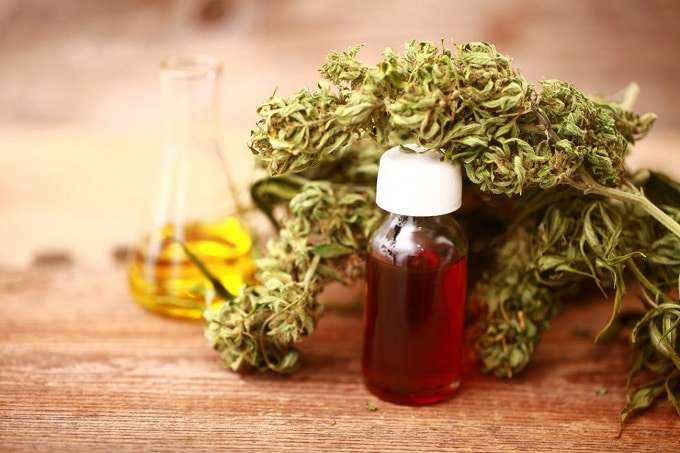
CBD hemp oil is an oil based tincture which is made from CBD extract that is extracted from a hemp plant.
Hemp is legally defined as a plant of the cannabis genus which does not exceed a THC content of 0.3% by dry weight.
Marijuana is also a plant of the cannabis genus. But marijuana contains far higher concentrations of THC, generally ranging anywhere from 1% to 20% or more.
CBD hemp oil differs from CBD marijuana oil because it is made from hemp and does not contain significant concentrations of the psychoactive cannabinoid, THC.
CBD marijuana oil generally contains higher amounts of THC.
CBD extracted from the hemp or marijuana plant can be made into a variety of products including tinctures, edibles, vape oils, and salves for topical use.
Is Marijuana Oil Better Than Hemp Oil?
Some marijuana advocates and doctors claim that CBD oil made from marijuana is a superior medicinal product to CBD oil made from hemp.
In Cannabis Revealed, Dr. Goldstein writes:
“Hemp is not an optimal source of CBD or other medicinal compounds.”
In Chronic Relief: A Guide to Cannabis for the Terminally & Chronically Ill, Nishi Whitely writes:
“…hemp plants are poor producers of cannabinoids and therefore generally have low levels of cannabinoids, especially THC. Keep in mind that cannabinoids reside predominantly in the trichomes, which are the small glands on the exterior of the cannabis flower and leaf, not within the seed or stalk.”
Project CBD’s Martin Lee writes:
“Hemp-derived CBD and refined CBD powder lack critical medicinal terpenes and secondary cannabinoids found in cannabis oil. These compounds interact with CBD and THC to enhance their medicinal benefits.”
On one hand, these experts have a strong argument and are correct in their position.
But they are failing to consider that there are many varieties of hemp and thus many varieties of CBD hemp oil.
Using cannabis oil as a therapeutic agent is more complex than just ingesting the main cannabinoids, THC, and CBD.
The whole of cannabis is greater than the sum of its parts – this is known as the entourage effect.
The entourage effect is the synergistic relationship of the many compounds found in cannabis.
These compounds are mainly the cannabinoids, terpenes, and flavonoids of the cannabis plant.
These compounds work better when they are taken together as opposed to in isolation.
Research has verified the entourage effect.
Marijuana advocates claim that due to the fact that marijuana flowers produce more resin than their hemp cousins, the oil made from marijuana will have a greater entourage effect for the consumer.
The resin of a cannabis plant is mostly produced in the flowers and this is where the beneficial cannabinoids, terpenes, and flavonoids are found in their greatest concentration.
So, is it all about the resin?
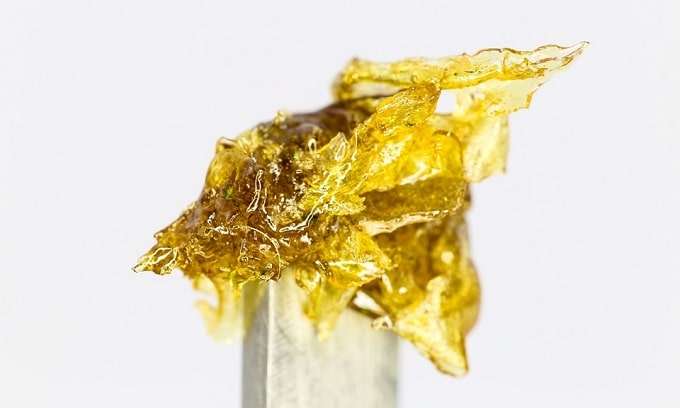
Yep, it’s all about the resin. When it comes to cannabis as a therapeutic agent, the resin is what counts. The resin holds the medicine.
Cannabis has thousands of uses from food in the form of hemp seeds, to building material in the form of hempcrete, and all the way to durable clothing in the form of hemp fiber.
But if you want to use cannabis to make medicine, you need the resin.
And the most resinous cannabis plants are generally marijuana plants. Hemp has traditionally been bred not for resin production, but for fiber and seed production.
This is why if you look at a typical hemp field, you will see tall, lanky plants with big stalks and tiny flowers.
On the other hand, walk into the greenhouse of a marijuana grower and you’ll find yourself among big resiny buds filled with the therapeutic cannabinoids, terpenes, and flavonoids.
Look at the difference between typical hemp plants and a typical marijuana plant below:

So does that mean hemp sucks for making CBD oil and is only good for making shirts for hippy festivals and seeds for health gurus?
No way. It just depends on the type of hemp.
See plants have genetics just like people and all living things.
In the same way humans have bred specific kinds of dogs for unique purposes, cannabis horticulturists have bred cannabis plants to have specific kinds of characteristics.
When it comes to hemp, there are two main varieties: high resin hemp and low resin hemp.
Low resin hemp is the typical hemp you see growing in big fields. It’s tall and strong and the farmers don’t grow it for its flowers.
It’s mass-produced and used for fiber and seed production. It’s a useful plant and has been grown by humans for thousands of years.
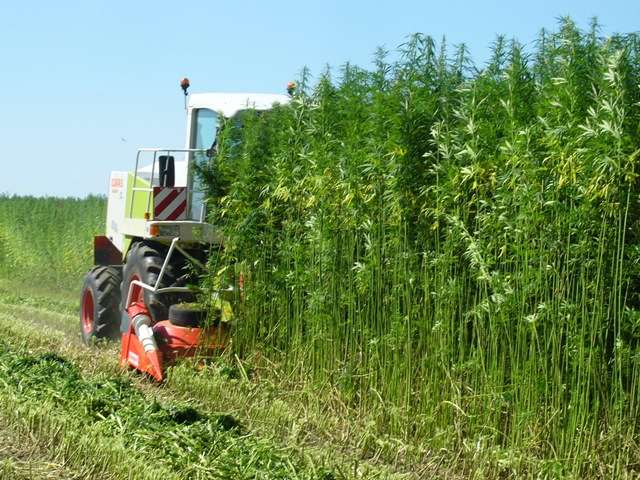
Despite being high in resin, high resin hemp won’t get you high. It’s not allowed to contain more than 0.3% THC in its resin by dry weight.
Otherwise, it wouldn’t be considered hemp anymore and would be considered marijuana.
If the grower who grew it was only licensed to grow hemp and not marijuana, the plant would be destroyed and not allowed to be used for making any products.
When marijuana advocates claim that CBD from hemp should be avoided, they are failing to consider that there are different kinds of hemp.
There’s hemp that’s best for making fiber and seed (low resin hemp) and hemp that’s best for making quality CBD hemp oil (high resin hemp).
In fairness, Dr. Goldstein and Martin Lee have nothing against CBD from hemp.
They are just trying to protect their readers and ensure they get the highest quality cannabis remedy.
But this doesn’t change the fact that currently for millions of people, it’s far easier to obtain CBD hemp oil than it is CBD marijuana oil.
The laws on hemp CBD are more lenient and inclusive than those on CBD from marijuana, mainly because CBD from marijuana contains significant amounts of THC and CBD hemp oil does not.
But isn’t THC important and good for me?
THC has many beneficial effects just like CBD as well as its own unique effects.
THC and CBD work synergistically together and seem to perform better when they are taken together than separately (remember: the entourage effect)
But taking high amounts of THC alongside CBD is not ideal for many people.
First off, there’s the legal hurdle mentioned above. You may live in a place that only allows for CBD use and not THC.
You may not like the psychoactive effect of THC (the “high”).
Some studies have shown that mixing CBD with THC decreases the psychoactive effects of THC.
But that’s something only you can judge through your own trial and error of various products.
Some of you may get drug tested for your job or an organization you are part of.
A product with a lot of THC would make you fail a drug test whereas CBD is not a compound that’s tested for in drug screenings.
CBD hemp oil still contains some THC — remember up to 0.3%.
While this isn’t a large amount, we still warn our readers that ingesting large quantities of CBD hemp oil regularly can put you at risk for failing a drug test for the presence of THC.
If you are subject to taking drug tests but still want to use CBD, your best bet would be a CBD isolate with ZERO THC.
Is my CBD hemp oil filled with toxins and pesticides?
Hemp is an efficient bioaccumulator.
A bioaccumulator is a plant that cleans up the area where it’s grown by absorbing toxins and nasty stuff from the soil.
This is great for the environment.
Have you ever heard of the Chernobyl nuclear disaster in Ukraine?
Hemp was grown in the area of the disaster to clean up the soil.
That’s all well and good for nuclear remediation but you definitely don’t want to be ingesting a product (CBD hemp oil) that’s made from a plant that excels at absorbing toxins.
This is one of the main reasons why cannabis advocates like Martin Lee of Project CBD and Dr. Bonni Goldstein oppose CBD from hemp.

They have a solid point.
Because a lot of the CBD hemp oil on the market today comes from low resin hemp plants normally grown for fiber and seed production, the likelihood of toxins being present is higher than had the oil been produced from high resin plants.
Martin Lee and Dr. Goldstein are simply trying to protect their beloved patients and readers. I get it.
I will explain why CBD hemp oil made from low resin hemp plants is more likely to contain toxins.
All hemp, no matter if it’s a high resin or low resin variety, contains some amount of CBD. High resin varieties contain far more —sometimes as much four times more.
Anyway, this is how it works when you are extracting CBD from hemp: the less CBD that’s present in each plant, the more plants you need to make the concentration of CBD hemp oil you want in your bottle, i.e. 250 mg of CBD per ml of oil.
And the more hemp plants you process, the greater the likelihood you will end up with a product that has toxins, mold, and pesticides in it. It’s simply an issue of probability and concentration.
Now, this is not to say that all CBD products made from low resin hemp plants are “bad”.
It’s just a word of caution that you need to make sure you know the source of your CBD products.
Demand labs from the seller and check the lab reports thoroughly.
More on that later.
But forget the toxins for a second and consider this important point: low resin hemp plants, although they do contain CBD, are lacking in the other beneficial compounds of cannabis (terpenes, flavonoids, secondary cannabinoids) which contribute to the entourage effect.
These compounds are found in the resin and since these plants are low resin plants, they may be lacking in these beneficial compounds.
At CBD School we recommend you seek out CBD hemp oil only from companies who make the oil from high resin hemp plants.
These companies are putting out a higher quality product which will provide you with the entourage effect you want.
Is CBD hemp oil legal or not? What’s the deal?
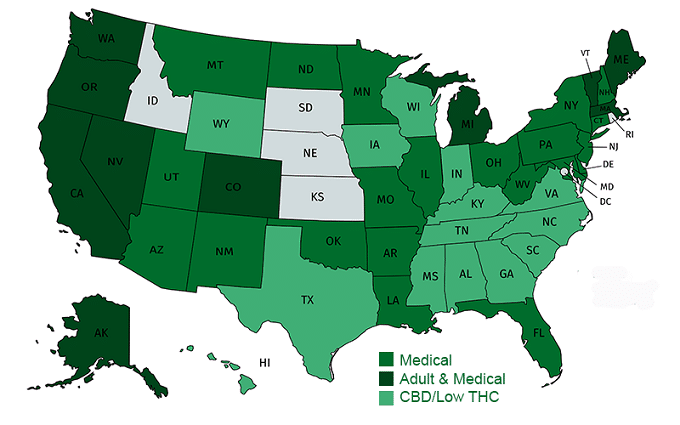
I’ve talked to some of the best lawyers in the industry on this question. I am doing all I can to find out for you.
Unfortunately, as it stands now, the legal issue with CBD hemp oil is not black and white.
In December 2016, the DEA ignorantly tried to make all CBD products illegal, no matter the source of the CBD.
Hemp companies and CBD advocates are fighting the DEA for overstepping their bounds.
In the CBD corner, the main contender is the Hoban Law Group, one of the nations premier cannabis law firms. The Hobans have filed a case against the DEA.
The case is still ongoing.
I have talked to multiple members of the Hoban law group. They are confident that the DEA is wrong and that the CBD hemp oil business is going nowhere.
As a consumer, you need to know the laws in the state where you live.
Yeah, I know you can order CBD hemp oil off of Amazon and have it shipped right to your front door.
But that doesn’t necessarily make it legal to use in your state.
Know the laws of your state and you will be fine!
Keep in mind that no CBD consumers have ever had criminal action taken against them – the only people who have suffered legal consequences because of CBD are brick and mortar retailers who were selling CBD hemp oil in their physical stores.
Just figure out the exact CBD and hemp laws where you live and you will be OK.
Does my CBD hemp oil actually contain CBD?
The only way to know if you have a high quality CBD hemp oil is to get it from a reputable brand you trust.
Two of our favorite brands at CBD School actually use hemp seed oil as a carrier oil:
- BlueBird Botanicals
- NuLeaf Naturals
We have closely analyzed these brands.
They’ve passed our tests to be considered a reputable CBD supplier.
They take care of their customers, keep up-to-date lab reports, and work hard to provide quality products at reasonable prices.
Your CBD hemp oil brand should provide you with recent lab results on the product you bought.
Some companies even have batch numbers for each batch of CBD hemp oil they produce.
The batch number allows them to show you the labs for the exact batch you got.
The batch number will be somewhere on the label of your CBD hemp product.
The labs should show you exactly how much THC, CBD, secondary cannabinoids, and terpenes your CBD hemp oil contains.
The labs should verify that the CBD hemp oil you have is clean and free of any toxins, mold, or pesticides.
Be vigilant about getting labs!
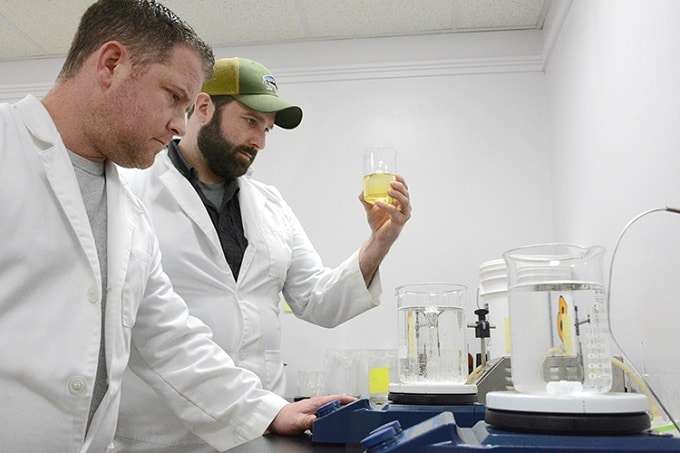
Don’t let some unscrupulous hemp oil sleeze bag scum take advantage of the flourishing cannabis industry and sell you an inferior product.
The responsibility is on YOU to seek out a reputable CBD hemp oil seller who will provide you with current lab results and a high quality, clean product.
Stay tuned for a future post coming up on CBD School on what to look for if you want to get a high quality CBD hemp oil.
CBD Hemp Oil vs. CBD Marijuana Oil: Who is the Winner?
Cannabis healthcare workers like Dr. Golstein and advocates like Martin Lee prefer CBD oil made from the marijuana plant.
This is because marijuana plants produce high resin flowers.
And the therapeutic compounds of cannabis are contained in the resinous flowers.
But that doesn’t mean that CBD marijuana oil is superior to a high quality CBD hemp oil made from high resin hemp plants.
CBD oil made from a high resin hemp plant, carefully grown, and cleanly extracted is no worse than CBD oil from a marijuana plant.
In some cases, CBD hemp oil is a better choice than a CBD marijuana oil.
You may have to take regular drug tests for work. (If that’s the case, stick with CBD isolate or products made from CBD isolate and ZERO THC)
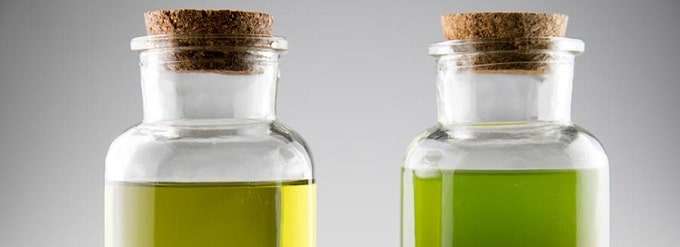
You may not be allowed to legally use anything from marijuana where you live.
You may not want the high THC content often found in CBD marijuana oil (you don’t want to get high).
If any of the above applies to you, then a CBD hemp oil is the best choice.
A high-quality CBD hemp oil will provide you with the benefits of CBD and cannabis therapy.
Just make sure you get a good one.
You may have to do a little extra homework.
But it will be worth it to get a great product for you and your family.
Go here to find out what to look for if you want to find the best CBD hemp oil.
